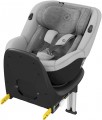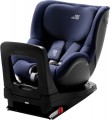ADAC test result
The results shown by the seat in crash tests according to the standards of ADAC — the General German Automobile Club, an authoritative European organization of motorists.
Car seats in such tests are evaluated in several categories, but in this point only one parameter is taken into account — the safety of the child, his/her protection in emergency situations. The results of such a test are indicated by the number of points; the fewer points in the end — the safer the product. It should be noted that the ADAC standards are much stricter than those by which the seat is evaluated during mandatory certification; tests are conducted with different directions of impacts (frontal and side), with dummies of different ages and so on. Therefore, the result of the ADAC test very reliably describes the real level of protection that the product provides in accidents.
According to this indicator, modern car seats can be divided into the following categories:
—
very good (< 1.5);
—
good (1.6 – 2.5);
—
satisfactory (2.6 – 3.5);
—
acceptable (3.6 – 4.5);
— unacceptable (more than 4.5).
The downside of a good value is usually a higher price; however, in an accident, that price may be a very small price to pay for the extra protection that can save your baby's life and health.
In c
...onclusion, it should be noted that ADAC test methods are constantly being improved and tests are conducted every year. Therefore, when choosing a seat and comparing it with its counterparts, you should also pay attention to the year of manufacture; as a rule, newer products with the same number of points give a higher actual level of protection than older ones.i-Size
The car seat meets the requirements of the European safety standard
i-Size (ECE R129). Within the framework of this standard, it is assumed that child car seats are classified according to the height and age of the child, and not by weight (as was previously the case). It is also mandatory to fasten the retaining device using the Isofix system (see “Isofix fastening”). In accordance with i-Size requirements, car seats must be installed rear-facing until the child is 15 months old or reaches a height of 105 cm. All i-Size certified car seats must pass a side impact test. Chairs and cars that meet the requirements of the standard are marked i-Size, which confirms their full compatibility.
Correct installation indicator
The presence in the design of the child restraint system of special
indicators of correct installation. They help ensure that the child car seat is installed correctly and follows all prescribed safety guidelines. Most often, such indicators are represented by special marks that change color or position when the car seat is installed correctly. Such indicators are placed on Isofix system locks, seat belts for fastening a child, etc. And some models for the youngest passengers have built-in levels or angle indicators that help set the seat in the correct position, facing the rear of the vehicle.
Adjustments
—
Backrest tilt adjustment. The backrest tilt can be adjusted. This point is different for various weight groups. In groups 0+ and 1 not the backrest, but the whole seat tilts against the fixed base, and in groups 2 and 2/3 only the backrest tilts. The possibility of adjusting the backrest tilt is important if the child is in the car for a long time – by tilting the backrest you can let the child sleep or rest.
—
Headrest height adjustment. According to safety requirements, the child's head should not be more than one third above the headrest, so it is necessary to adjust the headrest as the child grows.
—
Harness height adjustment. The ability to adjust the height of car seat harnesses — such a need arises as the child grows.
—
Backrest width adjustment. The ability to adjust the width of the backrest allows you to optimally adjust the car seat not only for constantly changing height, but also for the child's complexion.
—
Horizontal position of a backrest. The backrest of the car seat is horizontal. The horizontal position is optimal for babies under the age of six months, since it avoids unnecessary stress on the spine, therefore group 0 car seats usually have this function.
—
Removable backrest. It is possible to comp
...letely remove the backrest of the car seat. This function expands the possibilities of the seat: it can be used both for its intended purpose, with a backrest, and as a booster (for more information on boosters, refer to "Weight group 3").
— Swivel system. The seat swivels relative to a fixed base. This makes it easier to drop off and pick up the child: during these operations, the seat can be turned to face the car door, and when driving, it can be positioned in or against the direction of travel.Additional side protection
The car seat has structural elements that further protect the child from side impacts. At least such elements include sidewalls for head protection made of impact-absorbing material such as polyurethane foam; torso protection may also be provided. If you are looking for a car seat with the maximum level of protection, you should choose from models with
additional side protection.
Country of origin
The country of origin of the brand under which the product is marketed. Often indicated by the nationality of the company or the location of its headquarters. At the same time, the actual production capacity of the brand often differs from the country of origin.
The quality of products is more influenced by the organization of processes and quality control at all production stages than by geography. Therefore, biases against brands from specific regions are generally unfounded. Consideration of a brand's country of origin becomes relevant only when the goal is to actively support or avoid manufacturers from a particular state.

